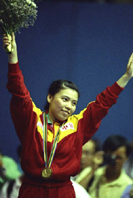|
Deng held the top ranking in women's single table tennis for eight years until retiring in 1997 and entering Beijing's well-known Tsinghua University to study English. It is common for retired athletes to study once they have finished their sporting careers. Young people with the highest potential are sent to professional sports centers at a young age, where all costs are covered by the government, so they are engrossed in training and sports achievements rather than education. Even if they continue to study, the exhausted athletes are hard pressed to concentrate. Lacking systemic schooling and other professional skills, most elect to study at university once they finish their sporting careers. However many former athletes find it difficult to keep up with university study due to their minimal education, and some end up dropping out.
|

|
| Deng Yaping won gold in the women's table tennis singles in 1992 |
Although Deng's English was poor when she first studied at Tsinghua, she never shrank from a challenge. On the contrary, she set aside 14 hours a day to study, and worked so hard that at one point her hair started falling out. After months of assiduous labor, she went on exchange to the UK's Cambridge University to study English in early 1998. This turned out to be an even tougher school experience.
To catch up with other students at Cambridge, Deng only slept a few hours a day and usually had instant noodles for dinner. No pain, no gain. After she graduated in 2001 she could speak fluent English with native speakers. Deng continued to make persistent efforts and in September 2002 she obtained a Master's degree from the University of Nottingham in Britain.
Presently Deng is working towards a doctorate in economics at Cambridge University. The former "queen of table tennis" has achieved an impressive academic record through willpower and persistence. "You've got the key to access the world," wrote former IOC president Juan Antonio Samaranch in the prelude to Deng's Masters thesis.
Quite a lot of China's retired sports stars have chosen to become government officials. Cai Zhenhua, former world champion in men's table tennis, is now the deputy director general of the General Administration of Sport in China. Xu Haifeng, a former marksman who won China's first Olympic gold medal in 1984, is now deputy director of the Chinese Cycling and Fencing Administration Center. Xiong Ni, the gold medalist of the men's 3m springboard at the 2000 Sydney Olympics, was appointed as the deputy director of Hunan Provincial Bureau of Sports at the age of 30, making him the youngest bureau-level official in Hunan.
Coaching the Next Generation
Numerous retired athletes in China are now coaches. The experience of Lang Ping, a former member of Chinese Women's Volleyball Team, is representative. At both the 1996 Atlanta Olympics and the 2008 Beijing Olympics, a team coached by Lang reached the final. Lang herself won gold as part of the Chinese Women's Volleyball Team at the 1984 Los Angeles Olympics, so she has been closely involved in three Olympic finals.
As a player, Lang was known as "iron hammer," and helped her team win five successive world championships. During the 1980s Lang Ping and her teammates became legends in China and were regarded as "national heroines." Lang Ping's image and the team photo were commemorated on stamps, coins and souvenir badges.
Lang was forced to retire at the height of her career in 1985 due to serious injuries. She remained involved in volleyball however, joining a club in Italy in 1989, and returning to China a year later to assist the Chinese Women's Volleyball Team win silver at the 11th World Women's Volleyball Championships held in Beijing.
Lang's coaching career started in the 1990s. By the middle of that decade, China's national team had slipped to eighth in the world rankings. Lang was lured back home to coach the Chinese team and pull it out of the doldrums. Within 18 months the team took the silver medal at the Atlanta Olympics, much to everyone's surprise. After the team was runner-up in the 1998 World Championship, Lang left for a second time.
In 2005, Lang accepted an invitation to coach the U.S. Women's Volleyball Team. A close friend of hers disclosed that Lang considered the offer carefully before accepting, afraid that coaching a foreign team might hurt the feelings of the Chinese people. If the Americans played the Chinese, she wouldn't be able to bear the pressure from her countrymen. As she considered what to do, an online survey showed the majority of Chinese netizens understood Lang Ping's position. Their tolerant and gentle attitude impelled Lang to accept the offer.
Under Lang, the U.S. team made miraculous progress. The Americans, under Lang's guidance, spared no effort in defeating the Chinese team, and then achieved a convincing victory over Cuba in the semi-final of the Beijing Olympics. Finally they took silver medal.
On the evening of August 15, during the match between the U.S. and China, Chinese president Hu Jintao and his wife turned up to watch the game. The U.S. won three to two. When Lang Ping left the hall, the Chinese audience responded with warm applause. In the final the audience treated the Americans as if they were the home team. Apparently Lang's status of "national heroine" has never changed.
| 